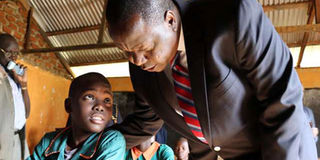Education now back on the right track

Education Cabinet Secretary Fred Matiang'i talks to a KCPE pupil at Kilingili Primary School in Vihiga County on November 1, 2016. PHOTO | TONNY OMONDI | NATION MEDIA GROUP
What you need to know:
- If you look keenly, you will realise that university students who avoid the tedious work of studying and look for corners to cut cheated in the KCSE.
- Needless to say, the entrenched culture of shortcuts is a bane to progress in many spheres of our society.
That cheating in national examinations has been an intractable problem is an understatement.
This problem has been a curse that has threatened to reverse the gains made in education.
This deep-running malady has defied all remedies and the education managers were on the verge of throwing their hands in the air in despair.
However, the arrival of Dr Fred Matiang’i has revived hopes that this problem can be eradicated.
For the short stint that the Cabinet secretary has been at the helm of the Education ministry, he has injected fresh energy and incomparable zeal that promises to bring about needed reforms.
Granted, cheating is just one among a myriad of challenges afflicting education Queries have been understandably raised on whether the exams are the best way to holistically gauge the abilities and talent of the students.
I share these concerns because it is impossible to sufficiently assess skills and knowledge as well as strengths and weaknesses of a student in an exam that takes only a few hours.
Despite its inherent weaknesses, this is the system that we currently have to determine the abilities of our children.
We must, therefore, make the best use of it.
MAJOR CONSEQUENCES
Cheating in exams has far-reaching ramifications.
For instance, universities are unable to know for sure whether they have been admitting qualified students into various programmes.
It is not uncommon to find students who had supposedly passed with flying colours in high school being completely at sea at the university.
This is because the courses into which they are admitted are not in tandem with their abilities.
If you look keenly, you will realise that university students who avoid the tedious work of studying and look for corners to cut cheated in the KCSE.
Such students will never see the need to burn the midnight oil as dishonesty and greed will be wired in their system.
Needless to say, the entrenched culture of shortcuts is a bane to progress in many spheres of our society.
Incompetence and complacency bred by tribalism, nepotism and little regard for meritocracy are also our key undoing.
Cheating in exams is bound to entrench this despicable set of malpractices.
This makes it very urgent for us to find a lasting solution.
Therefore, what CS Matiang’i is doing is quite commendable.
But his efforts alone will not root out the vice.
It behooves everyone to pitch in and make their contribution.
If we take the cue from the CS’s resolve and commitment, we will bring sanity to a system that is suffering from all manner of ailments.
JOIN IN
Perhaps the most daunting challenge besides the cheating scourge is the crying need to improve the general quality of our education.
A lot of work needs to be done, right from kindergarten to university, to ensure that our education meets the requirements of a rapidly growing population and a developing economy such as ours.
Universities, particularly, have an onerous task of aligning their programmes with the dynamic needs of the society.
The question of half-baked graduates has been exercising the minds of education experts and industry players for quite a while.
Fingers have been pointed at the examination system in our universities with claims that some students are awarded good grades for reasons other than hard work and intellectual capacity.
Universities have also received the flak for running universities mainly as businesses at the expense of their primary role of providing quality education and conducting research.
These issues need far-reaching regulatory reforms and more importantly Matiang’i-like zest to address.
The CS has shown us the way; can we all borrow a leaf from him?
Dr Gicharu is founder and chairman Mount Kenya University




